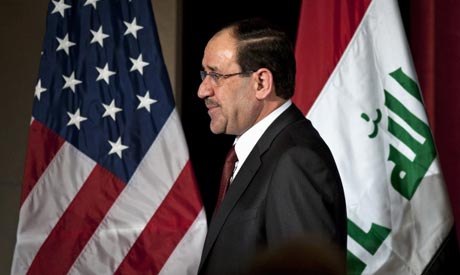
Iraq's Prime Minister Nouri al-Maliki walks onstage prior to speaking at the U.S. Chamber of Commerce in Washington, Tuesday, Dec. 13, 2011. (Photo:AP)
Iraq will send a delegation to Syria to try to convince Damascus to implement an Baghdad initiative to end months of bloody conflict, Prime Minister Nuri Al-Maliki said on Thursday.
"When I arrive in Baghdad, I will hold a meeting to prepare the plans to send a delegation to Syria in order to implement the Iraqi initiative," Maliki told AFP as he flew back to Iraq from Washington.
"America and Europe are afraid of the phase after (Syrian President) Bashar Al-Assad. That is why they understand the initiative" from Iraq, Maliki said.
On the other hand, Al-Maliki told AFP on Thursday that oil giant ExxonMobil has promised to reconsider an exploration deal with Iraqi Kurdistan that Baghdad has strongly opposed.
"We had a meeting with (Exxon) in Washington and we discussed the contracts, some of which are located in disputed areas," Maliki told AFP in an exclusive interview as he flew back to Iraq from Washington.
"They promised to reconsider their decision," Maliki said.
Kurdistan on 18 October inked a deal with ExxonMobil for it to explore six areas, but Baghdad regards any contracts not signed with the central government as invalid.
An official with the Iraqi oil ministry said that two of the areas -- Al-Qosh and Bardarash -- are actually parts of Nineveh province that Kurdistan wants to annex into its autonomous region, a move Baghdad opposes.
The Kurdistan contract potentially puts an Exxon contract with the Iraqi government in jeopardy.
In January 2010, Iraq's oil ministry completed the deal with ExxonMobil and Anglo-Dutch giant Shell to develop production at West Qurna-1, which with reserves of about 8.5 billion barrels is the country's second-biggest field.
Short link: